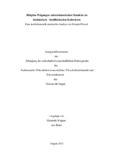Citation link:
https://nbn-resolving.org/urn:nbn:de:hbz:467-8108Files in This Item:
| File | Description | Size | Format | |
|---|---|---|---|---|
| Wegner_Elisabeth.pdf | 7.93 MB | Adobe PDF |  View/Open |
| Dokument Type: | Doctoral Thesis | metadata.dc.title: | Religiöse Prägungen unternehmerischen Handelns im hinduistisch – buddhistischen Kulturkreis : eine institutionenökonomische Analyse am Beispiel Nepal | Other Titles: | The impact of religious beliefs on economic behavior of entrepreneurs in a Hindu – Buddhist culture : an institutional economic analysis from Nepal | Authors: | Wegner, Elisabeth | Institute: | Fakultät III - Wirtschaftswissenschaften, Wirtschaftsinformatik und Wirtschaftsrecht | Free keywords: | Religion, Hinduismus, Buddhismus, informelle Institutionen, religiöse Prägungen, Hinduism, Buddhism, Nepal, Institutions, Entrepreneur | Dewey Decimal Classification: | 330 Wirtschaft | GHBS-Clases: | PNA PNH |
Issue Date: | 2013 | Publish Date: | 2014 | Abstract: | Religionen beeinflussen das Verhalten von Menschen. Ihr Einflussvermögen kann zum einen ganz offenkundig in Politik und Gesellschaft in Erscheinung treten, zum anderen wirken Religionen über ihre affektive Verankerung eher im Verborgenen. Darüber hinaus hat Religion auch eine ökonomische Bedeutung. Aus wirtschaftswissenschaftlicher Sicht stellt sich die Frage, ob und mit welcher Stärke Religionen einzel- und wirtschaftspolitisches Handeln beeinflussen können und ob dieser Einfluss eher wirtschaftsfördernd, neutral oder sogar wirtschaftshemmend in Erscheinung tritt. Die vorliegende Arbeit analysiert und vergleicht mithilfe einer empirischen Studie das Einflussvermögen des Hinduismus und Buddhismus auf die Einstellungen und Handlungsweisen von Unternehmern in Nepal. Interdependenzen von Religion und Ökonomie werden in ausgewählten Themenbereichen untersucht, die sich dadurch auszeichnen, dass sie neben ihrer einzelwirtschaftlichen Relevanz auch gesamtwirtschaftliche Wirkungen implizieren. Dazu gehören: Karma und Wiedergeburt, Frauen als Humankapital-Ressource, Vertrauen und Netzwerkstrukturen sowie Aspekte der religiösen Ethik im Hinblick auf die Bereitschaft zur Mitwirkung bei Korruptionshandlungen. Religion influences the behavior of people. Its impact is quite obvious in politics and society, but religion also has more subtle impacts on economic behavior of populations and on economic policy. From the economic point of view, it is important to figure out how and how intensive religion affects economic attitudes and behavior and if its outcome is rather conducive, neutral or even negative for the economic development of a country. This research study analyses and compares the impact of Hinduism and Buddhism on economic decision-making of entrepreneurs in Nepal and its macroeconomic implications. Research areas were selected as follows: Karma and rebirth, women, trust and networking and religious ethics in the context of corruption. |
URN: | urn:nbn:de:hbz:467-8108 | URI: | https://dspace.ub.uni-siegen.de/handle/ubsi/810 | License: | https://dspace.ub.uni-siegen.de/static/license.txt |
| Appears in Collections: | Hochschulschriften |
This item is protected by original copyright |
Page view(s)
7,920
checked on Nov 27, 2024
Download(s)
519
checked on Nov 27, 2024
Google ScholarTM
Check
Items in DSpace are protected by copyright, with all rights reserved, unless otherwise indicated.

